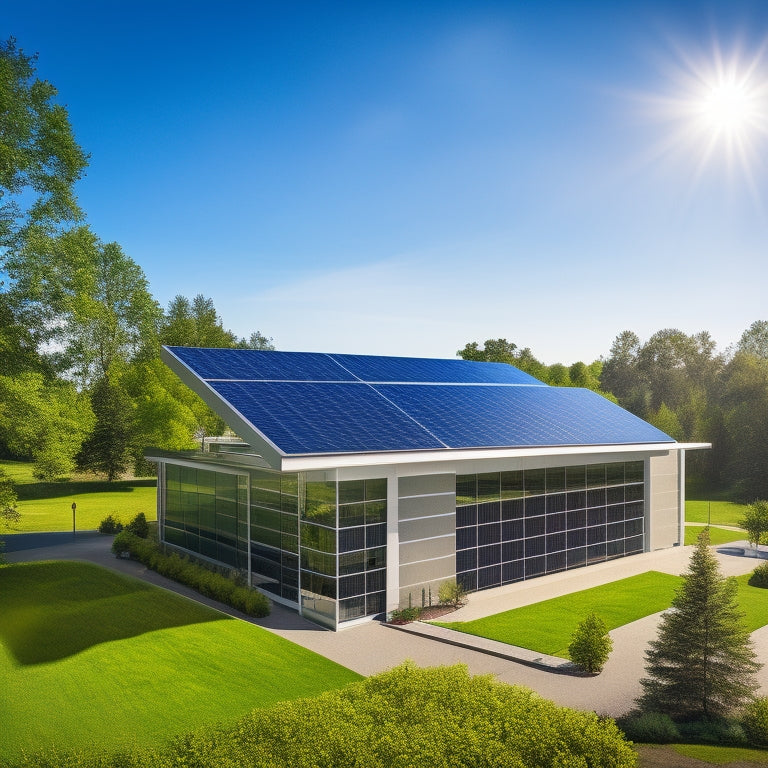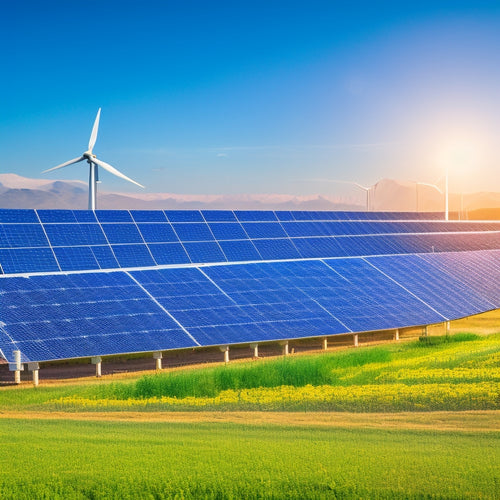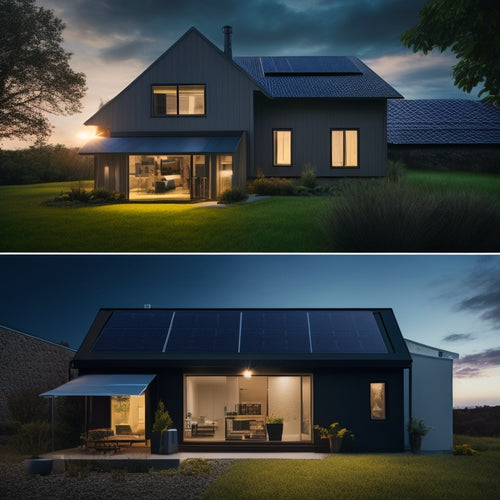
What's the Cost of Business Solar Panels for My Company
Share
When considering the cost of business solar panels, think about both initial investments and long-term savings. Installation might seem high, but federal tax credits can reduce costs by 26%. Efficient panels enhance energy production, decreasing future bills considerably. You'll also benefit from minimal maintenance and extended lifespans of over 25 years. By analyzing your energy consumption, you can identify the ideal system size for your needs, maximizing savings. In the end, these financial incentives and efficiencies pave the way for a sustainable future. There's much more to investigate, so keep going to uncover the full potential of solar investment for your business.
At a Glance
- Installation costs can be offset by long-term savings on energy bills, significantly reducing monthly expenses over time.
- Federal Investment Tax Credit (ITC) allows a deduction of 26% of solar installation costs, plus potential state-specific incentives.
- Higher efficiency ratings (18-22%) from panels enhance energy production, optimizing savings and reducing the number of panels needed.
- Regular energy audits help identify consumption patterns, informing decisions on the size and type of solar system to install.
- Minimal maintenance and robust warranties ensure long-term reliability, with solar panels lasting 25 years or more, contributing to overall cost-effectiveness.
Long-Term Energy Savings
Investing in solar panels can greatly reduce your energy bills over time, allowing you to allocate those savings to other critical areas of your business.
By leveraging financial incentives available for solar installations, you can further enhance your return on investment.
Additionally, you can take advantage of available tax incentives that further enhance your return on investment.
Reduced Energy Bills
One of the most persuasive advantages of installing solar panels for your business is the significant reduction in energy bills over time. By utilizing the power of the sun, you can generate your own electricity and minimize your reliance on traditional energy sources. This not only leads to lower monthly expenses but also protects you from fluctuating energy prices.
Different solar panel types offer various efficiencies and costs, allowing you to choose a system that aligns with your budget and energy needs. While installation costs can seem intimidating initially, they often pale in comparison to the long-term savings you'll enjoy.
With each passing month, you'll see a decrease in your utility bills, which can be reinvested into your business for growth and innovation. Moreover, these savings compound over the years, allowing you to achieve a return on investment that's hard to ignore.
As you gain energy independence, you'll experience a newfound freedom, knowing that your business's energy costs are under your control. Embracing solar energy isn't just an environmentally friendly choice; it's a strategic financial move that strengthens your business for the future.
Tax Incentives Available
Beyond the immediate savings on energy bills, solar panel installation opens the door to various tax incentives that can considerably enhance your financial benefits. One of the most significant incentives is the federal Investment Tax Credit (ITC), which allows you to deduct a substantial percentage of your solar installation costs from your federal taxes. This means your initial investment can be offset, making solar financing options more accessible.
Additionally, many states offer their own tax credits and rebates, which can further reduce your upfront costs. By taking advantage of these incentives, you not only lower your financial burden but also increase your return on investment over time.
Another benefit to evaluate is the potential for renewable energy certificates (RECs). These certificates can be sold to utility companies, providing you with an extra income stream while promoting your commitment to sustainability.
In a world where energy independence is increasingly valued, these tax incentives enable you to make a financially sound choice that aligns with your company's principles.
Embracing solar energy isn't just about cost savings; it's about seizing the opportunity for long-term freedom from fluctuating energy prices.
Tax Incentives and Rebates
When considering the cost of business solar panels, it's essential to factor in available tax incentives and rebates.
The federal tax credit can greatly reduce your upfront investment, while state incentive programs often provide additional savings customized to your location.
Additionally, leveraging the financial incentives available can further enhance the affordability of solar energy solutions.
Federal Tax Credit
The Federal Tax Credit for solar energy systems greatly reduces the upfront cost of business solar panels, making them a more appealing investment for companies. By taking advantage of this credit, you not only improve your solar investment but also contribute to your business sustainability goals.
Here's a quick overview of the benefits:
| Benefit | Description | Estimated Savings |
|---|---|---|
| Tax Credit Percentage | 26% of the total system cost | Varies by investment |
| Eligibility Criteria | Must be installed and operational in the year claimed | Business-owned systems |
| Credit Expiration | 26% for installations through 2022, 22% for 2023 | Plan ahead! |
| Transferability | Can be transferred to a tax equity investor | Enhance funding options |
| Additional State Incentives | Check local programs for extra savings | Maximize benefits |
Utilizing the Federal Tax Credit can greatly lower your initial expenses, allowing you to redirect resources toward other business initiatives. This tax incentive not only improves your bottom line but also aligns with a growing commitment to sustainable practices—an essential aspect of modern business. Don't miss out on this opportunity to strengthen your company financially and ethically.
State Incentive Programs
State incentive programs offer a beneficial opportunity for businesses to further reduce the cost of solar panel installations through various tax incentives and rebates.
By taking advantage of state funding, you can greatly lower your upfront expenses, making solar energy a more accessible option for your company.
Many states provide local grants specifically designed to support businesses that invest in renewable energy.
These grants can cover a portion of your installation costs, making it easier to shift to solar. Additionally, tax incentives like property tax exemptions and income tax credits can enhance your savings, allowing your business to retain more of its hard-earned profits.
It's essential to research your specific state's programs, as they can vary widely.
Some states even have performance-based incentives that reward you for the energy your solar system generates.
Panel Efficiency Ratings
When choosing solar panels for your business, understanding efficiency ratings is essential. Higher efficiency means more energy production from the same amount of sunlight, translating directly into cost savings over time.
Additionally, as solar panel efficiency has improved considerably—from typical ratings of 12-14% to 18-22%—this advancement can greatly impact your energy capture and overall system performance, particularly in optimizing energy harvest through performance benchmarks.
Understanding Efficiency Ratings
Understanding efficiency ratings is fundamental for anyone considering business solar panels, as these ratings directly impact energy production and long-term savings. When you explore solar panel technologies, you'll notice that efficiency ratings range widely, typically between 15% and 22%. This percentage reflects how much sunlight a panel converts into usable electricity. A higher efficiency means you can generate more power from a smaller roof space, which is essential for maximizing your investment.
When conducting an efficiency comparison, consider factors like the type of solar cells used. Monocrystalline panels often lead the pack in efficiency, followed by polycrystalline and thin-film options. Each has its pros and cons, so it's important to align your choice with your business's energy needs and available space.
Ultimately, understanding efficiency ratings isn't just about numbers; it's about enabling your company to make informed decisions. By choosing panels that meet your efficiency needs, you're taking a significant step toward energy independence and sustainability.
This knowledge will help you utilize the freedom that comes with renewable energy, ensuring your investment pays dividends for years to come.
Impact on Cost Savings
Although many factors influence the cost savings of business solar panels, panel efficiency ratings play an essential role in determining your return on investment. Higher efficiency ratings mean that a panel can convert more sunlight into electricity, which directly impacts your energy savings.
If you invest in panels with superior efficiency, you'll generate more power with fewer panels, reducing your initial investment and overall installation costs.
Moreover, these efficient panels can maximize your energy production even in limited space, enabling you to utilize solar power effectively—especially important if your business has restrictions on roof area.
By choosing high-efficiency panels, you can also benefit from various financing options designed to enhance affordability. Many financing plans allow you to pay off your investment with the savings you gain from reduced energy bills.
Ultimately, selecting panels with better efficiency ratings not only enhances your immediate savings but also increases the long-term value of your solar investment.
You'll gain greater energy independence, allowing you to focus on what truly matters—growing your business and enjoying the freedom that comes with sustainable energy solutions.
Assess Your Energy Consumption
To effectively assess your energy consumption, start by analyzing your energy bills to understand your overall usage patterns.
Conducting an energy audit can also help identify high consumption areas and track usage over time, revealing when you consume the most energy and highlighting opportunities for solar energy savings.
This analysis not only helps you make informed decisions about solar panel installation but also informs energy needs to optimize your energy efficiency strategy.
Analyze Energy Bills
How much are you really spending on energy each month? To make informed decisions about solar panels, you need to analyze your energy bills. Start by examining your consumption patterns. Look closely at your monthly statements; they reveal not just your costs, but also trends in your energy use.
Conducting energy audits can help you understand where your money's going. These audits provide understanding into your facility's efficiency, highlighting areas where you may be wasting energy and, consequently, money.
Are there times when your usage spikes unexpectedly? Identifying these patterns will enable you to make strategic changes that could lead to significant savings.
You might find that investing in solar panels could offset your current expenses and safeguard you from rising energy prices. By understanding your energy consumption, you'll not only gain control over your bills but also take a step toward energy independence.
This isn't just about saving money; it's about freeing your business from unpredictable energy costs. Seize the opportunity to analyze your energy bills today, and see how solar panels can change your company's financial future.
Identify Peak Usage Times
Identifying peak usage times is crucial for understanding your energy consumption patterns and can lead to significant savings for your business. By pinpointing when your energy demand is at its highest, you can strategically plan your operations. This not only helps in reducing costs but also guarantees you're using renewable energy more efficiently if you choose to invest in solar panels.
Start by implementing energy monitoring tools that track your energy consumption throughout the day. These tools can provide data on when your peak demand occurs, allowing you to make informed decisions. For instance, if you notice high consumption during certain hours, consider shifting energy-intensive tasks to off-peak times. This can lower your utility bills and improve your overall energy strategy.
Additionally, understanding your peak usage times can guide your solar panel installation. You'll want to verify your solar system aligns with these demand periods, maximizing your return on investment and minimizing reliance on the grid.
Welcome this freedom to control your energy costs, and take proactive steps toward a sustainable and financially sound future for your business.
Lower Maintenance Costs
When you invest in solar panels for your business, you'll appreciate the minimal upkeep they require.
With few moving parts and durable materials, these systems can save you significant time and money on maintenance.
As a result, your focus can shift back to core business activities rather than routine repairs.
Minimal Upkeep Required
Regularly maintaining solar panels is often simpler than many business owners expect, as these systems typically require minimal upkeep. With their impressive solar panel lifespan of 25 years or more, you can enjoy long-term energy savings without the hassle of frequent maintenance.
In fact, most panels only need a thorough cleaning once or twice a year, depending on your location and environmental factors. You might wonder about maintenance frequency, but the truth is, solar panels are designed to be sturdy and weather-resistant. They can withstand various elements, meaning you won't have to worry about constant repairs or check-ups.
Just keep an eye out for debris or dirt, and a simple rinse is usually all it takes to maintain efficiency. Moreover, many manufacturers offer warranties that cover maintenance issues, providing an added layer of peace of mind.
By investing in solar panels, you're not just reducing energy costs; you're also streamlining your operational expenses. Embracing this technology allows your business to thrive with fewer disruptions, giving you the freedom to focus on growth and innovation.
Frequently Asked Questions
How Long Do Solar Panels Typically Last for Businesses?
Solar panels typically last 25 to 30 years, offering substantial benefits for your business. With minimal maintenance requirements, you'll enjoy long-term energy savings and sustainability, enhancing your freedom to innovate without worrying about energy costs.
Can I Install Solar Panels on a Leased Commercial Property?
You can install solar panels on a leased commercial property, but check your lease agreements first. Understanding tenant responsibilities is essential, as some leases might restrict modifications. Equip yourself by clarifying your options with the landlord.
What Happens if My Business Expands and Needs More Energy?
As your business blossoms like a sunlit garden, planning for increased energy needs becomes essential. Investing in energy efficiency now guarantees you're equipped for future growth, providing the freedom to thrive without limitations or burdens.
Do Solar Panels Increase My Property Value?
Solar panels can enhance your property value, especially with solar incentives in place. Property appraisals often reflect energy-efficient upgrades positively, making your investment appealing to potential buyers who value sustainability and reduced energy costs.
Are There Financing Options Available for Commercial Solar Installations?
Yes, you've got financing options for commercial solar installations. Solar loans can help spread costs, while tax incentives can greatly lower your investment. These choices enable you to adopt renewable energy without financial strain.
Explore More
Investing in solar panels isn't just about the initial cost—it's about the long-term benefits that can reshape your company's energy environment. With potential savings, tax incentives, and lower maintenance costs, going solar isn't merely a trend; it's a smart business move. So, why not utilize the sun's power and watch your savings soar? As you assess your energy consumption, remember: every ray of sunshine is an opportunity waiting for you. Don't let it slip away!
Related Posts
-

The Role of Battery Monitoring Systems in Renewable Energy
Battery monitoring systems play an essential role in renewable energy by enhancing system longevity and optimizing pe...
-

High-Efficiency Solar Battery Chargers for Remote Areas
High-efficiency solar battery chargers are essential for your off-grid energy needs in remote areas. They maximize en...
-

Cost of Home Solar Battery
You're looking to invest in a home solar battery to reduce your grid reliance, but you're curious about the cost. The...


